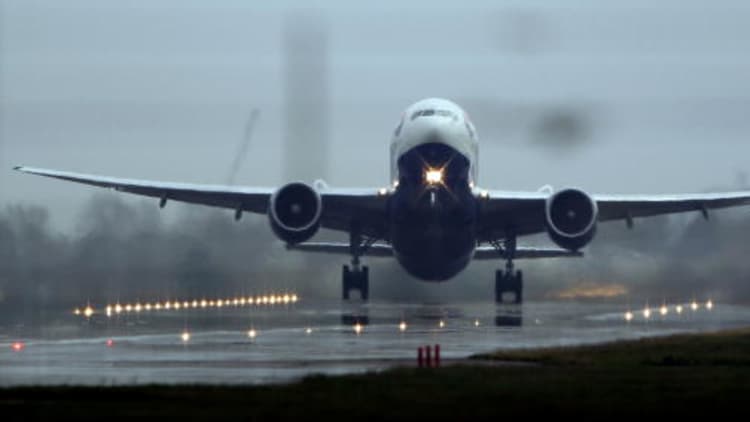Airlines are set to report to investors how they fared during a bustling, stormy and expensive summer season, starting when Delta Air Lines releases its third-quarter earnings Thursday.
The third quarter includes the busy summer travel season, but this period was more expensive for airlines to operate than last year, ramping up pressure on airline executives to show they can grow profits amid higher costs. Average jet fuel prices in the July-September period were 35 percent higher than in the same three months last year, according to data from S&P Global Platts. Fuel is generally airlines' second-largest expense after their employees' salaries.
Airline stocks have lagged the broader market, despite strong demand for air travel. The NYSE Arca Airline index, which tracks 15 carriers, is down 14 percent so far this year, compared with the S&P 500's 7 percent gain.
U.S. carriers have scrambled to raise revenue in the past few months as fuel prices rose. JetBlue Airways raised the fee to check a first bag by $5 to $30, a move that United Airlines, Delta and American Airlines followed. A relief for airline executives — but perhaps not consumers. President Donald Trump signed legislation last week to fund the Federal Aviation Administration, but lawmakers scrapped a provision that would have established federal oversight of airline fees.
Others, including American, cut certain routes to focus on more profitable flights. Airlines' other challenges included a stormy summer that led to the cancellation of thousands of flights, particularly from Hurricane Florence, which hit the Carolinas in early September.
Here are a few things to watch in U.S. airline earnings:
- Delta: The airline's shares are down more than 7 percent this year, but analysts polled by Thomson Reuters are hopeful that the carrier will increase its adjusted quarterly profit by 11 percent to $1.75 a share on close to $12 billion in revenue, up 8 percent from a year ago. Delta warned earlier this month that Hurricane Florence would cost it $30 million in pretax income but said revenue per seat mile, an industry gauge of pricing power, would likely rise 4 to 4.5 percent over the third quarter of 2017. The airline's executives will likely address the timing of its Airbus A220 planes. These regional aircraft were caught in a bitter trade battle last year, but Delta has said it expects them to be in service by early 2019. They will also update investors on Delta's lucrative credit-card partnership with American Express.
- United: Far and away, United is the winner among airline stocks this year. Shares are up more than 23 percent in 2018, making the airline the sole U.S. carrier to post a return so far this year. Investors, who dumped shares after United unveiled an aggressive growth plan earlier this year, will be curious how the airline plans to address rising costs as it grows. They'll also be watching for an update on the integration of Continental and United flight crews earlier this month, eight years after the two carriers merged. United's leadership will probably be asked about contract negotiations with their unionized pilots, whose agreement runs through January 2019. A sore subject with mainline pilots would be if United plans to grow by outsourcing more flights to smaller, regional carriers. Executives will also likely address the expansion of premium economy, a class of service on international flights between business and regular coach. These fares are often double a basic economy fare and come with more legroom, higher-end food and amenity kits.
- American: Shares of the world's largest airline are struggling more than any other U.S. carrier. American's stock price is down more than 30 percent so far this year. The carrier's per-share adjusted earnings will likely come in at $1.21, down close to 15 percent from the third quarter of 2017, on $11.6 billion in revenue, according to analysts polled by Thomson Reuters. Investors will focus on where else American will scale back flying to cut costs and whether American has been able to raise airfares without damping demand. CEO Doug Parker in January said that airfares are "too low for oil prices this high." American is revamping its narrowbody fleet to fit more seats on board, which drives down operational costs, and executives are likely to discuss that progress. It recently adjusted its basic-economy product to include a carry-on bag that fits in the overhead bin, bringing its no-frills fare more in line with Delta's.
- Southwest: The largest domestic carrier by passenger traffic is expected to increase its per-share earnings 21 percent to $1.07 on $5.57 billion in revenue, according to analyst estimates collected by Thomson Reuters. Executives are likely to update investors on a return to advertising in the wake of a deadly engine failure on board one of its flights in April. They are also likely to get questions on when the Dallas-based airline will start flying its Boeing 737 jets to Hawaii, which requires federal approval.



